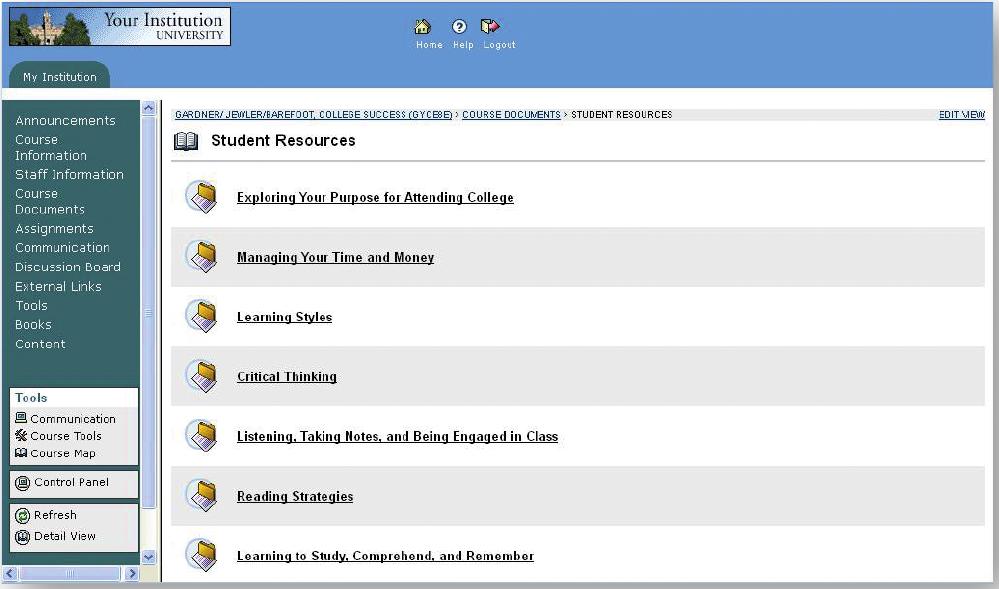Tech Tip: Connect
TECH TIP CONNECT
If the thought of a two-hour lecture in an auditorium crammed with two hundred students fills you with a warm glow, chances are you’re an auditory learner. What if you’re a visual learner who needs charts, graphs, and videos and these are missing from the lecture? Or what if you are a hands-on, group type who thrives best when immersed in a project and has the opportunity to work with others? Many colleges and universities have introduced a course-management system, or CMS. A CMS is a Web site that boosts your ability to connect with the material you’re studying—as well as with your instructors and classmates—both in-and outside of class.
1 THE PROBLEM
You don’t really understand what a CMS is or don’t have the slightest clue how to use one, and you aren’t so sure that it sounds good to you that a CMS “makes” you learn course material in a whole new way.
2 THE FIX
Be open-minded about this technology. With patience, you’ll learn how to make it work for you. Figure out your learning style (by taking an online survey or test like Myers-Briggs) and look for classes that complement your strengths. At the same time, find ways to adapt to teaching techniques that lie outside your comfort zone.
3 HOW TO DO IT
To get motivated, think of all the advantages that a CMS offers. A CMS offers lots of other ways to help you connect with your instructors, your classmates, and the material. It lets you keep track of your grades and assignments. It offers a digital drop box for safely submitting your work. It also makes a lot of fun things possible, such as online discussion forums and interactive group projects where you can do things like sketch ideas on whiteboards that other students can view or even collaborate on written assignments in real time. Some CMSs have the excellent advantage of making available to you videos, recorded lectures, or even your instructor’s lecture notes. In other words, the basic ingredients of a CMS—video, audio, and text—appeal to different learning styles.

If you’re an aural learner, you’ll love audio recordings. To get the most from text, read your notes and textbook passages aloud as you study. (You can even record them to play back to yourself.) While you’re at it, listen to books on tape and join a study group for discussions. To get the most from video clips, listen to them once and then play them back with your eyes closed.
If you’re a visual learner, you’ll love videos, pictures, maps, and graphs. To get the most from audio recordings and text, take notes and illustrate them, playing up key points with colored highlighters, pictures, or symbols. You can also create a graph or chart to display important concepts.
If you’re a kinesthetic or hands-on learner, you’ll love labs, group projects, and any kind of fieldwork. To get the most from audio, video, and text, sit in the front row of your classroom, take notes, and read things aloud as you study. Build models or spreadsheets. Take field trips to gather experience. In other words, get creative.
KNOW THIS
Once you learn how to log into the system, do it often. CMS use varies from one department or instructor to another, and you want to make sure you don’t miss anything. If you’re having trouble logging in or figuring out your username and password, ask your instructor for help.
Figure how much online activity you can handle. If you sign up for face-to-face classes, you might only use a CMS for a few things, such as submitting assignments or swapping essays for peer review. If you enroll in a hybrid course, your instructor may step it up by posting outside reading material or creating online discussions on your CMS. In a fully online course, you’ll probably do everything on the CMS, including taking exams. Before you register at college, consider which type of course suits your schedule and learning style.
PERSONAL BEST
Your college’s CMS is designed to make your life easier, so don’t get bogged down by issues that prevent you from taking advantage of it. Turn to your favorite type-A classmate, your instructor or teaching assistant, or the campus computer lab or student success center. College is about finding solutions and learning how to make the most of the resources available to you. So, go out there and embrace your CMS!